Collection of Greek Coins of Pontus
Regnum Ponticum / Βασίλειον Πόντου
Polemon II / Πολέμων Β' 38-64 AD
| Polemon II of Pontus Marcus Antonius Polemon Pythodoros, also known as Polemon II of Pontus and Polemon of Cilicia (Greek: Μάρκος Ἀντώνιος Πολέμων Πυθόδωρος; 12 BC/11 BC–74) was a prince of the Bosporan, Pontus, Cilicia and Cappadocia. He served as a Roman Client King of Pontus, Colchis and Cilicia. Polemon II was the second son and middle child of the Pontic Rulers Polemon Pythodoros and Pythodorida of Pontus. His eldest brother was Zenon, also known as Artaxias III, who was Roman Client King of Armenia and his youngest sister was Antonia Tryphaena, who was married to Cotys VIII, King of Thrace. Polemon II’s father died in 8 BC. His mother then married King Archelaus of Cappadocia, and the family had moved to Cappadocia, where Polemon II was raised, along with his siblings, at the court of his stepfather. Archelaus died in 17, whereupon Polemon II and his mother moved back to Pontus. From 17 until 38, Polemon II lived as a private citizen in Pontus and assisted his mother in the administration of their realm. When his mother died in 38, Polemon II succeeded his mother as the sole ruler of Pontus, Colchis and Cilicia. According to an honorary inscription at Cyzicus in 38, Polemon II participated in celebrating the local games in the city, honoring Julia Drusilla, the late sister of Caligula; in this way Polemon II expressed his loyalty to the emperor and the Roman state. Polemon II with another Roman Client King Antiochus IV of Commagene, held athletic games in honor of Claudius in Cilicia in 47. Antiochus IV with Polemon II had showed favor towards Claudius in which they offered significant services to him. Around 50, Polemon II was attracted to the wealth and beauty of the Judean princess Julia Berenice, whom he had met in Tiberias during a visit to King Agrippa I. Berenice in turn wanted to marry Polemon II to end rumors that she and her brother were committing incest. Berenice was previously widowed in 48 when her second husband, her paternal uncle Herod of Chalcis, died. She had two sons by him, Berenicianus and Hyrcanus. Berenice however set the condition that Polemon II had to convert to Judaism, which included undergoing the rite of circumcision, before marriage. Polemon II assented, and the marriage went ahead. It did not last long however, and Berenice left Pontus with her sons and returned to the court of her brother. Polemon II abandoned Judaism and, according to the legend of Bartholomew the Apostle, he accepted Christianity, but only to become a pagan again. At an unknown date perhaps after the early 50s, Polemon II married a princess called Julia Mamaea who was from the Syrian Roman Client Emesene Kingdom. Mamaea was of Assyrian, Armenian, Greek and Median ancestry. Polemon II married Mamaea as his second wife and the circumstances that lead Polemon II to marry her are unknown. Through Mamaea’s marriage to him, she became a Roman Client Queen of Pontus, Colchis and Cilicia. The relationship between Polemon II and Mamaea is unknown. Mamaea marrying Polemon II is only known through surviving evidence. Her name and identity is revealed from surviving bronze coinage. Surviving coinage that was issued from Polemon II and Mamaea is extremely rare, as only three specimens are known. On surviving coinage, shows her royal title in Greek ΙΟΥΛΙΑΣ ΜΑΜΑΙΑΣ ΒΑΣΙΛΙΣΣΗΣ (of Julia Mamaea the Queen) or ΒΑΣΙΛΙΣΣΗΣ ΙΟΥΛΙΑΣ ΜΑΜΑΙΑΣ (of Queen Julia Mamaea). These coins can be dated from the second half of Polemon II’s reign from 60 until 74. She bore Polemon II two sons who were Polemon and Rhoemetalces. Her sons that she bore to Polemon II are known from a restored surviving inscription from Amphipolis Greece, that is commemorating Polemon II, Polemon and Rhoemetalces is dated from the second half of the 1st century. Polemon II renamed the town Fanizan and named the town after himself to Polemonium (modern Fatsa Turkey). In 62, Nero induced Polemon II to abdicate the Pontian throne, and Pontus, including Colchis, became a Roman province. From then until his death, Polemon II only ruled Cilicia. [Wikipedia] SHH v4391 Extremely rare, perhaps the third specimen known. The first specimen is in the Beirut Museum, see H. Seyrig, Scripta Nummaria (Paris 1986), pp. 156-158 fig. 8 (most probably from the same pair of dies). The second specimen: MMAG Deutschland 19, 16 May 2006, Righetti Collection, lot 334. Originally having been appointed king of Pontus by Caligula in 38 AD, Polemo made a career dependent on Roman politics. When he was deprived of his (nominal) rule of Bosporus in favor of a certain Mithradates in 41, Claudius gave him the district of the Cilician city Olba instead. In 64, Polemo got at least a part of Armenia as a reward for assisting Corbulo's campaigns. However, just four years later Nero annexed the kingdom of Pontus, and so Polemo's rule was confined to the city of Olba. The king's consort appearing on this coin was Polemo's second wife. His first marriage was to Berenike, sister of Agrippa II and later consort of Titus. His second wife, Mammaea, given the identity of the names, seems likely to have originated from the same region in Syria as the later Roman empress Julia Mamaea and her family. [Gemini, LLC VI/133] |
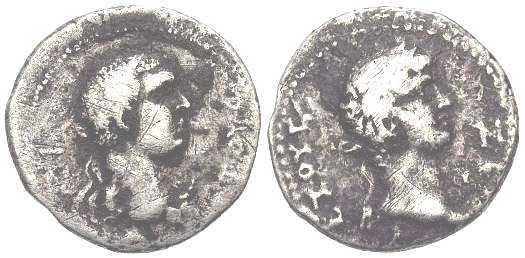 |
| SHH 2165 |
| Polemon
/ Claudius Drachm AR Amisus (?) Copenhagen 237/238; RPC I 2813/2820 |
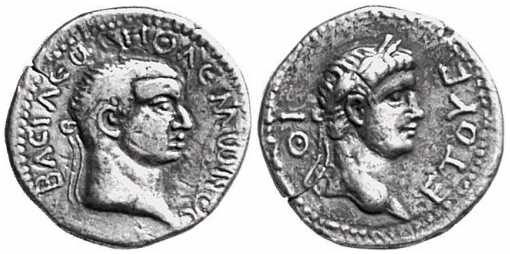 |
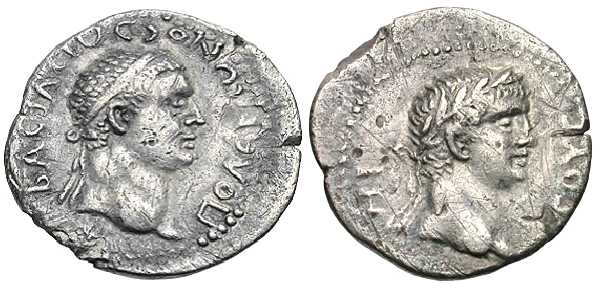 |
| SHH 1725 |
SHH 3648 |
| Polemon
/ Nero Drachm AR Amisus (?) Copenhagen 241/242; RPC I 2828/2836 |
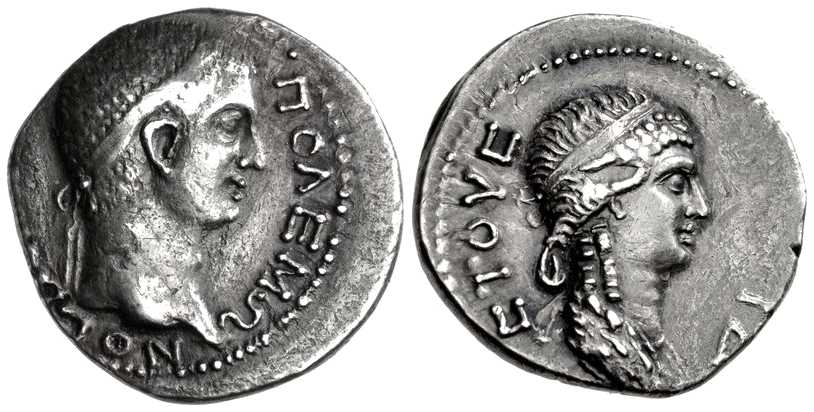 |
| SHH 5424 |
| Polemon
/ Tryphaena Drachm AR Amisus (?) Copenhagen ---; RPC I 2823/2827; von Aulock 6687/6689 |
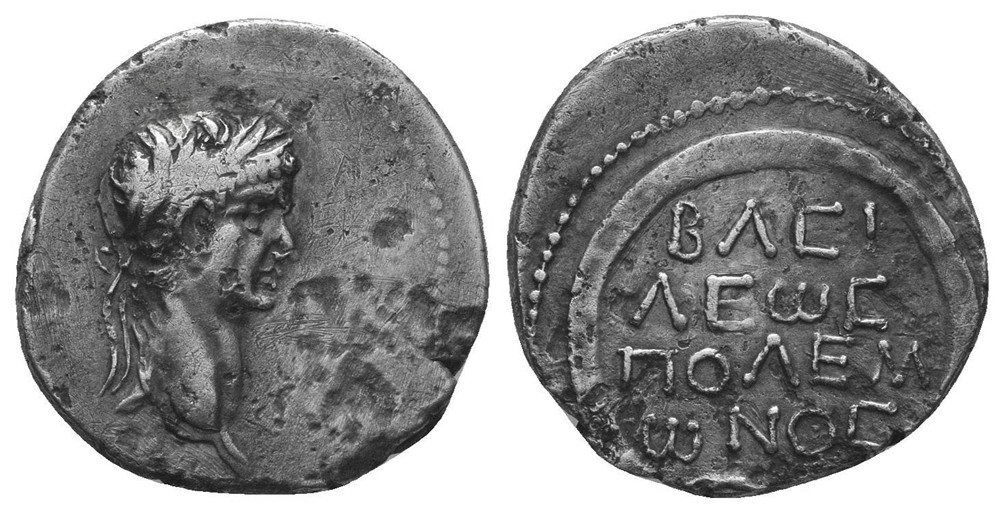 |
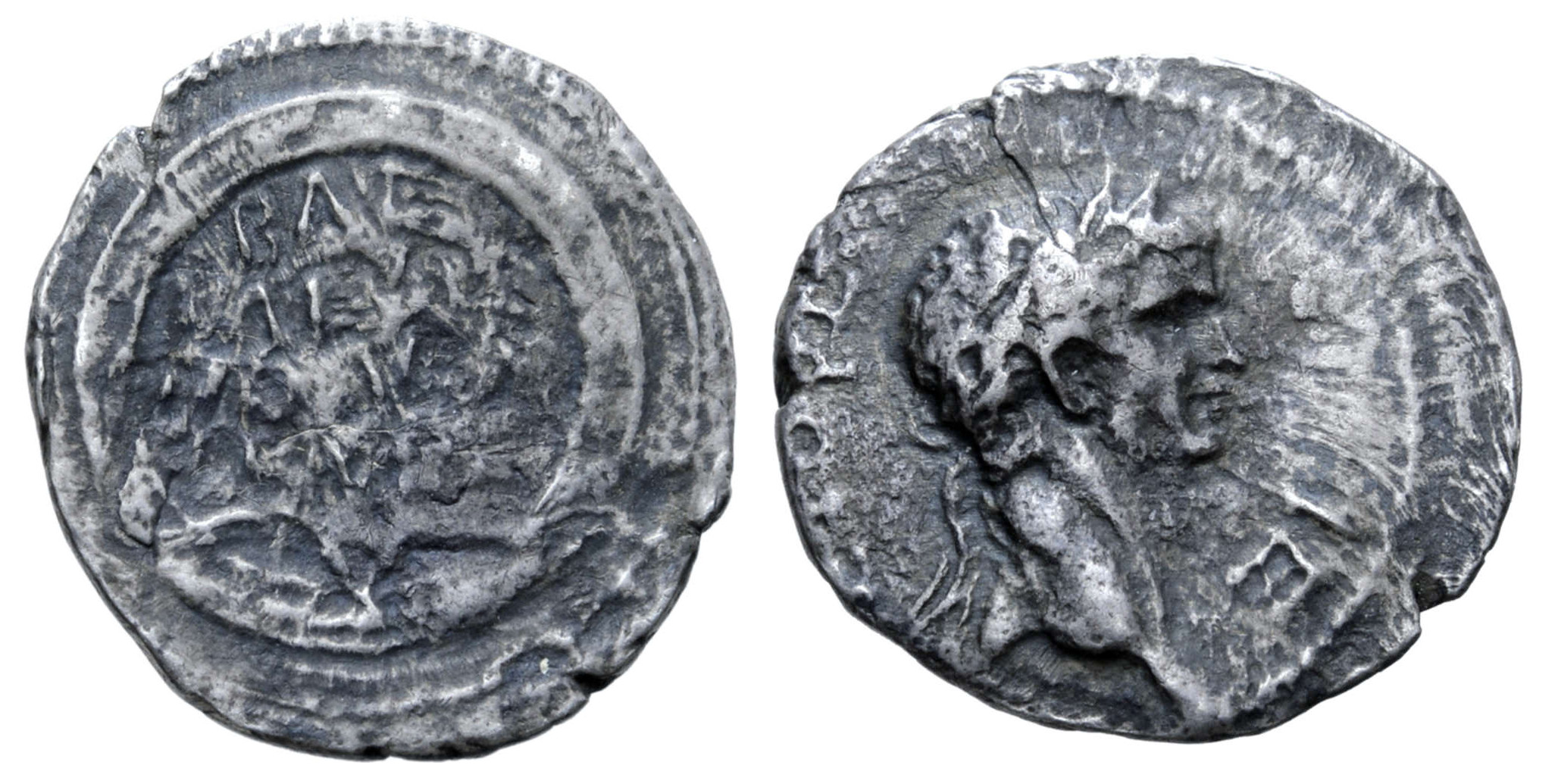 |
| SHH 7214 |
SHH
v5441 |
| Diadem,
ΒΑΣΙΛEΩΣ ΠΟΛΕΜΩΝΟΣ /
Claudius laureate right, ETOΥΣ IE Drachm AR Amisus (?) RPC I 3818; Stancomb 1038 v5441 2.71 g ≈19 mm Roma Num. 783E/157, 23.7.2020 |
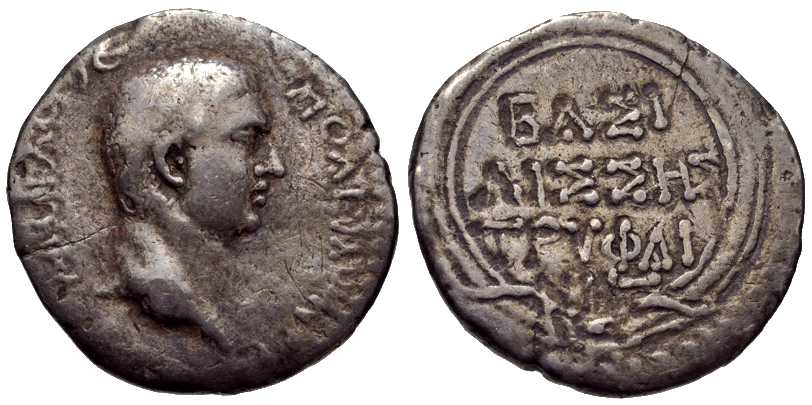 |
| SHH 3812 |
| Polemon
/ ΒΑΣΙΛΙΣΣΗΣ ΤΡΥΦΑΙΝΗΣ Drachm AR Amisus (?) Copenhagen ---; RPC I 2812 |
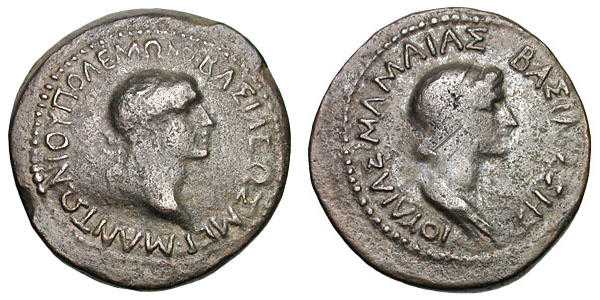 |
| SHH
v4391 |
| Polemon
/ Iulia Mamaea, ΙΟΥΛΙΑΣ ΜΑΜΑΙΑΣ ΒΑΣΙΛΙΣΣΗΣ AE Amisus (?) M&MDE 19/334 Gemini LLC VI/133 |
